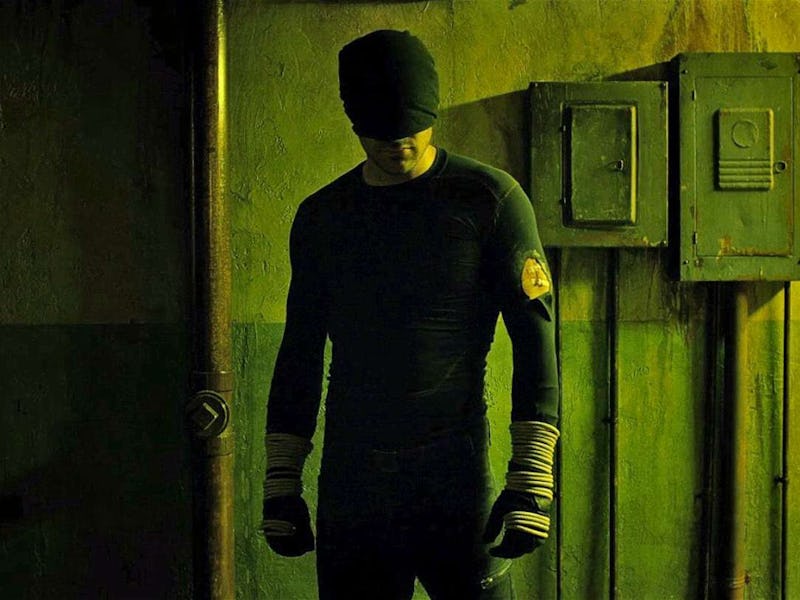Netflix’s Daredevil Was More Than Just An Action Thriller
Though it was praised for its brutal action, there’s another reason that Daredevil stands the test of time.

Thematically speaking, Netflix’s Daredevil didn’t break any new ground. Representing the Venn diagram overlap between Batman and Spider-Man, Matt Murdock embodies the oldest and most well-trod tropes of the superhero genre: A morally tormented man who struggles to balance his double life as a masked vigilante, fighting crime in a version of New York that feels more like 1970 than 2015. The show’s main claim to fame was its brutal action sequences, launching the MCU’s first foray into adult-rated media. But 10 years after Daredevil’s premiere, we can attribute its staying power to something less easy to quantify: Its deceptively sincere emotional storytelling.
Building on those classic vigilante archetypes, Charlie Cox’s Matt Murdock is charming yet tragic. Within a couple of episodes, we understand that most of his personal problems are simultaneously self-inflicted and unavoidable, rooted in his rigid sense of duty. Watching him make bad decision after bad decision, it’s easy to get invested in his sweet-natured friendship with his college roommate and legal partner Foggy Nelson, the brightest light in a dark tale. Their relationship is the cornerstone of Matt’s personal and professional life, doomed to fall apart if Foggy ever learns about his secret identity.
The emotional stakes here are sky-high. Matt has been lying to Foggy for his entire adult life, initially hiding the existence of his super-senses (a forgivable omission) and later covering up his activities as Daredevil, a violent persona that clashes with his day job as a defense attorney. The great irony of Daredevil is this back-and-forth regarding Matt’s trust in the law. He wants the system to work, but when it doesn’t, Daredevil provides an outlet for his frustrations — something that the more straightforward Foggy would never understand.
Throughout the early years of their friendship, Matt carefully disguised the vengeful side of his personality, creating a heartbreaking conflict when Foggy finally discovers the truth. The sense of betrayal here goes deeper than most superhero stories about secret identities, and as such it takes longer to heal. It’s not just that Matt has been lying to Foggy for years. It’s that he’s physically hurting himself and others. When the big reveal arrives toward the end of season 1, it takes place after Matt limps home from a viciously bloody beatdown, upending Foggy’s view of the life they’ve built together.
This tormented relationship arc benefited from two things during Daredevil’s three-season run: Excellent casting, and a lot more screentime than the equivalent sidekick subplot in a superhero movie.
The relationship between Matt and Foggy was the beating heart of the show.
Early in the show’s run, someone in the creative team clearly figured out that Charlie Cox is a fantastic crier. Along with capturing Matt Murdock’s cocky courtroom charisma and suppressed violent nature, he’s particularly effective at transmitting Matt’s raw vulnerability. Playing Daredevil as an emotional livewire, he’s the MCU’s reigning champion of picturesque suffering — and compared to Marvel’s A-listers at the time, he also felt surprisingly young. During Matt and Foggy’s first meeting with their future friend Karen Page, Matt wryly admits that they’ve only been practising law for “about seven hours.” They’re still tripping over the first steps of adult life, adding an amusing plausibility to Matt’s terrible choices elsewhere.
Daredevil’s smart casting and psychological depth also extended to its villains; often a weak point in the MCU’s big-screen storytelling. Introduced as Daredevil’s main antagonist, Vincent D’Onofrio’s Wilson Fisk is more than the sum of his parts. On paper a clichéd gang boss, he soon established himself as a quirky and perversely watchable villain, motivated by desires and compulsions that mirror Matt’s dysfunctional moral drives.
Over the course of that first season, we discover Fisk’s thin-skinned fragility, his desire for loyal companionship, and his troubled childhood backstory. Despite being a generation older than the show’s heroes, in some regards he seems less mature — a trait we can partially pin on childhood trauma, but is equally connected to his clout in the criminal underworld, which gives him the freedom to lash out whenever he doesn’t get his way. Contrasting with Matt’s messy love life, he receives one of the most compelling romantic storylines in the entire MCU, sharing a sedate courtship with gallery owner Vanessa Marianna. While Matt alienates his friends by lying and keeping secrets, Fisk finds his first true partner by opening up about his past.
Cox’s tortured performance helped elevate Daredevil above other superhero shows.
When Daredevil made the transition Disney+ for Daredevil: Born Again, many fans wondered whether it could retain the same level of R-rated action. The answer turned out to be yes, but as we make our way through this new revival, we’re reminded that bloodthirsty action was just one element of the original Daredevil’s success.
As someone who hasn’t watched the Netflix series since its cancellation in 2018, I was startled by how much Foggy’s demise hit me during Born Again’s season premiere. Charlie Cox really makes us feel the loss, and as the next chapter of Matt’s life unfolds, we realize just how well we’ve come to know him over the years. By no means a perfect show overall, Netflix’s Daredevil always understood what made its main characters tick. It always made us care, and ultimately that’s what makes it stand the test of time.